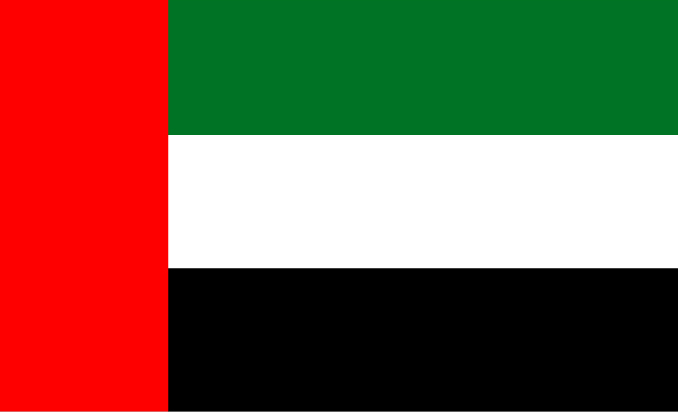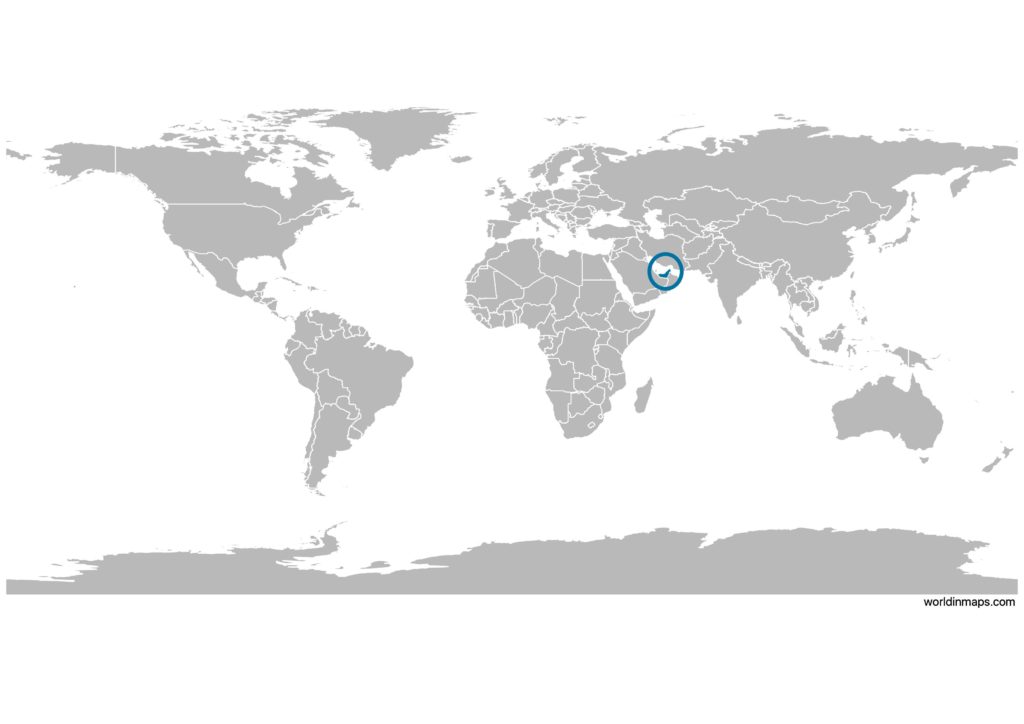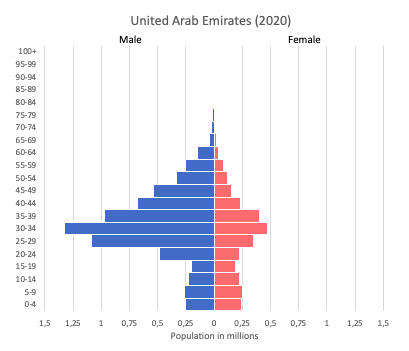United Arab Emirates (UAE)

| Government | |
| Name | United Arab Emirates |
| Arabic | الإمارات العربية المتحدة al-ʾImārāt al-ʿArabīyyah al-Muttaḥidah |
| Government type | federation of monarchies |
| Capital | Abu Dhabi (1,807,000 (2019)) |
| Currency | United Arab Emirates dirham (AED) |
| People | |
| Population (2020) | 9,890,400 (92nd) |
| Density of population | 99 P/km2 (110th) |
| Nationality | Emirati |
| Official languages | |
| Arabic | |
| Ethnic groups (2015) | |
| Emirati | 11.6% |
| South Asian | 59.4% |
| Indian | 38.2% |
| Bangladeshi | 9.5% |
| Pakistani | 9.4% |
| other | 2.3% |
| Egyptian | 10.2% |
| Filipino | 6.1% |
| other | 12.8% |
| Religions (2005) | |
| Muslim (official) | 76% |
| Christian | 9% |
| other | 15% |
| Life expectancy (2020) | |
| Male | 77.6 years |
| Female | 80.5 years |
| Total population | 79 years (63rd) |
| Homicides | |
| Total (2017) | 0.5 per 100,000 people (166th) |
| Geography | |
| Land area | 83,600 km2 |
| water area | 0 km2 |
| total area | 83,600 km2 (116th) |
| Mean elevation | 149 m |
| Lowest point | |
| Persian Gulf | 0 m |
| Highest point | |
| Jabal Yibir | 1,527 m |
| Land use (2011) | |
| Agricultural land | 4.6% |
| Arable land | 0.5% |
| Permanent crops | 0.5% |
| Permanent pasture | 3.6% |
| Forest | 3.8% |
| Other | 91.6% |
| Urbanization | |
| Urban population (2020) | 87% |
| Rate of urbanization | 1.71% annual rate of change (2015 – 2020) |
| Economy | |
| Labor force (2017) | 5.344 million (78th) |
| note: expatriates account for about 85% of the workforce | |
| Labor force by occupation (2000) | |
| Agriculture | 7% |
| Industry | 15% |
| Services | 78% |
| Unemployment rate (2016) | 1.6% (14th) |
| GDP (PPP) (estimate 2020) | |
| Total | $732.861 billion (32nd) |
| Per capita | $70,441 (7th) |
| GDP (nominal) (estimate 2018) | |
| Total | $432.612 billion (28th) |
| Per capita | $41,476 (19th) |
| GDP by sector (estimate 2017) | |
| Agriculture | 1% |
| Industry | 49.8% |
| Services | 49.2% |
| Exports (2017) | $308.5 billion (18th) |
| Exports partners (2017) | |
| India | 10.1% |
| Iran | 9.9% |
| Japan | 9.3% |
| China | 5.4% |
| Oman | 5% |
| Switzerland | 4.4% |
| South Korea | 4.1% |
| Imports (2017) | $229.2 billion (21st) |
| Imports partners (2017) | |
| China | 8.5% |
| US | 6.8% |
| India | 6.6% |
United Arab Emirates (UAE) on the world map

UAE is located in Asia and more specifically in the Middle East.
United Arab Emirates (UAE) top 10 largest cities (2019)
- Dubai (3,297,980)
- Abu Dhabi (1,807,000)
- Sharjah (1,274,749)
- Al Ain (766,936)
- Ajman (226,172)
- Ras Al Khaimah (RAK) (115,949)
- Fujairah (97,226)
- Umm Al Quwain (61,700)
- Khor Fakkan (39,151)
- Kalba (37,545)
Demography
Population pyramid

Age structure data
Estimate for 2020:
- 0-14 years: 14.45% (male 745,492/female 698,330)
- 15-24 years: 7.94% (male 431,751/female 361,804)
- 25-54 years: 68.03% (male 5,204,618/female 1,592,987)
- 55-64 years: 7.68% (male 658,892/female 108,850)
- 65 years and over: 1.9% (male 146,221/female 43,138)
Remark: the age structure of a population affects a nation’s key socioeconomic issues. Countries with young populations (high percentage under age 15) need to invest more in schools, while countries with older populations (high percentage ages 65 and over) need to invest more in the health sector. The age structure can also be used to help predict potential political issues. For example, the rapid growth of a young adult population unable to find employment can lead to unrest.
Population from 1950 to 2020
Source: United Nations, Department of Economic and Social Affairs, Population Division (2019). World Population Prospects 2019, Online Edition. Rev. 1.
Evolution of the life expectancy from 1960 to 2018
Source: World Development Indicators, The World Bank
Economy
Agriculture:
dates, vegetables, watermelons; poultry, eggs, dairy products; fish
Industries:
petroleum and petrochemicals; fishing, aluminum, cement, fertilizer, commercial ship repair, construction materials, handicrafts, textiles
Exports – commodities:
crude oil 45% (2012), natural gas, reexports, dried fish, dates
Imports – commodities:
machinery and transport equipment, chemicals, food
Time zone and current time in United Arab Emirates (UAE)
Go to our interactive map to get the current time in United Arab Emirates (UAE)